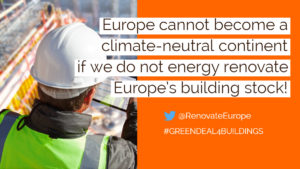As part of the final month of the #GreenDeal4Buildings campaign, Renovate Europe has produced two complementary briefings looking at the issue of financing deep energy renovation. While this briefing focuses on the need for strong policy, the potential of public-private partnerships, and the particular challenges of financing renovation in the residential sector, a complementary briefing examines ways to leverage funds through the Just Transition Mechanism and carbon revenues.
Within the EU context and existing 2030 energy savings targets, Renovate Europe notes an annual investment gap of €130-200bn. Some 80% of the investment is needed on the demand side, of which 71% must be directed to the residential sector, which is noted as being particularly challenging because the need for both action and financing is extremely granular.
Over the longer term – i.e. to 2050 – boosting the energy renovation rate to 3% annually would achieve the ambitious goal of reducing energy demand in buildings by 80% while drastically cutting carbon dioxide (CO2) emissions. In turn, this would cut total EU energy demand by 30%, reduce energy bills for all consumers, enhance productivity and increase property value and rentals. Such benefits could boost GDP by 0.7% annually; in 2020 alone, that would equal €39bn in additional public finances.
Renovate Europe calls upon EU institutions to ensure that the European Green Deal creates the ecosystem for deep energy renovation, including establishing stability that will eliminate the current ‘stop-go’ dynamic that erodes investor confidence. This includes making energy efficiency a top priority and planning beyond short-term measures.
You can read the briefing in full here.

